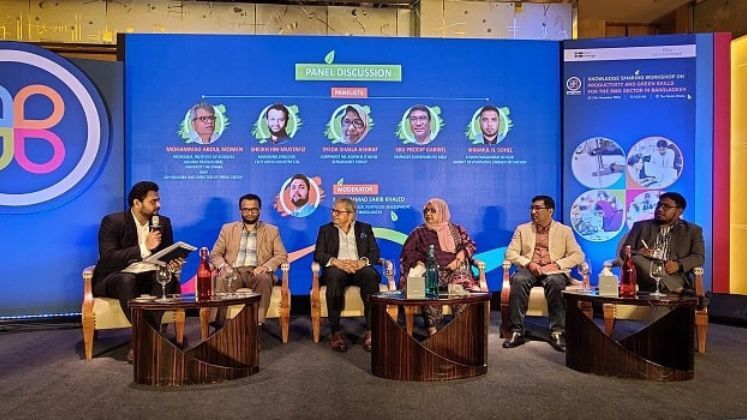
A knowledge-sharing workshop was organised by Swisscontact Bangladesh and the Swedish Embassy in Bangladesh with the goal of advancing green skills and productivity in the ready-made garment (RMG) industry. Key findings and experiences from the PROGRESS program, a four-year project run by Swisscontact with funding from the Swedish Embassy, were the focus of the event.
Additionally present was Sweden’s ambassador to Bangladesh, Nicolas Linus Ragnas Weeks, who emphasised the significance of tackling workplace issues including harassment and equitable pay in order to improve ties between Sweden and Bangladesh. In order to promote positive change and strengthen women’s empowerment in the nation, he reaffirmed Sweden’s continued commitment to funding programs like PROGRESS.
“The PROGRESS project is a step towards a more sustainable future,” said Maria Stridsman, Head of Development Cooperation and Deputy Head of Mission at the Swedish Embassy in Dhaka, in her opening remarks. “In the RMG industry, we are dedicated to advancing green practices. By working together, we can bring about long-lasting change.”
An overview of the project was given by Mir Rafiat Salman, Senior Manager of Skills & Productivity at PROGRESS, who emphasised its objectives of creating a profitable and self-sustaining RMG industry in Bangladesh that places a high priority on ethical labour practices and complies with international environmental standards, especially for female employees.
Brand representatives were among the many stakeholders from the textile and clothing industries that attended the event. Despite the industry’s progress towards sustainability, Sheehab Quadir, MD & CEO of Everbright Sweater Ltd., pointed out the continued difficulties the sector faced and advocated for tailored programs to successfully solve particular factory issues.
In order to boost women’s confidence, Biplob Barua, General Manager of Strategic HR at Urmi Group, stressed the value of upskilling them and putting them in leadership positions. Similarly, DPL’s Director and International Expert Charles Dagher commended the ability of Bangladeshi women workers while emphasising the necessity of a team effort to improve their potential. He underlined the significance of competent management, particularly the role of female supervisors in helping their colleagues.
Knit Asia Ltd. (Unit-2) Plant Head M. Fariduz Zaman Bhuiyan Sohel emphasised the vital role that industrial engineering plays in increasing the sector’s overall productivity and efficiency.






